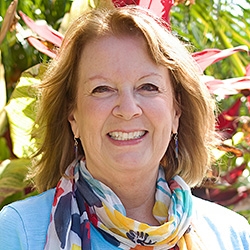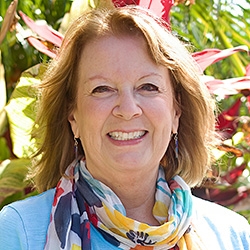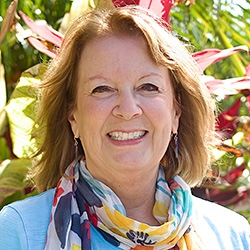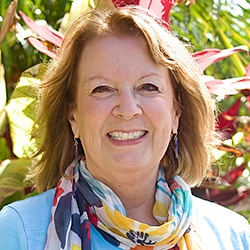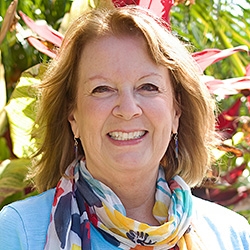
Search Results: men
-
Often making an apology is not enough because people want greater depth of understanding and empathy. Instead of judging ourselves or feeling guilt we can "mourn" what we did that stirred up pain in others. This can bring about a sweet pain that leads to change. Then we can ask ourselves what we can do next time and make a commitment to do this and/or offer a regrets to the person expressing feelings and needs.
-
Do you crave greater intimacy with your partner? Wish you had more ease for asking for what you want? Join relationship expert, Kelly Bryson in learning practical tips for building intimacy with your partner.
-
What do you do when you are thinking that it's not "emotionally safe" to speak honestly? Join CNVC Certified Trainer Arnina Kashtan as she explores this topic with a workshop participant.
-
CNVC Certified Trainer Arnina Kashtan tells us to look to our inner dialogue and the other's needs when we're feeling fear of physical violence that's been stimlated by someone's anger.
-
Join CNVC Certified Trainer Arnina Kashtan as she examines the nature of guilt and how apologizing often fails to connect us to our needs.
-
For this exercise choose a situation in which you have said a “yes” to someone‛s request but you didn't experience your “yes” as given freely or joyfully. Then explore judgements, feelings, needs, and alternate strategies that come up in relation to your “yes”, your “no”, and in relation to what the other person might be experiencing.
-
In this exercise choose a situation in which you got a “yes” to your request but you are not confident that it was agreed to freely or joyfully. Then explore your response to their “yes”, and possible unexpressed "no", with related observations, judgements, feelings, needs, requests, and alternate strategies that come up.
-
Blame is opaque when we don’t reflect on it deeply. We blame when we don’t see ourselves as having power to shape things, and see others as the ones who can. Blame and how we respond to it, is both a symptom of inability to step into power, and an impediment to empowered relationships. Transforming blame requires self-responsibility. Read on for practices involving empathy, inner connection, power, preparation and engaging options.
-
As social beings we thrive with social contact and community. Thus, with the social isolation and a loss of routine that is happening in the COVD-19 pandemic, there are three critical areas to keep in mind everyday: emotional-physiological regulation, self-empathy for fear and anxiety, and meaningful engagement.
-
In times of stress, some part of you may still hold the belief that you can't be present for the stressor and survive. Some part of you may believe you have to go away. There are three things you can consider when attempting to intervene with the reactive pattern of shutting down: how you relate to the shutting down, access to self-confidence, and engagement. Read on for more.
-
Before you make a request you can connect fully to a time when your need was met. Notice how your request feels and sounds different from this place of aliveness. Excitement about meeting a need implies confidence and trust about moving forward together. Offer an invitation to find strategies that work for both of you.
-
To resolve conflict, information of what's important to each party, plus corrections, needs to be included and built upon. Here we explore nine patterns of ongoing conflict, including diagnosis; assuming understanding; refuting; unhelpful communication mediums; over focus on intent over effect; and “hit-and-run” engagement. This is part one of a two part series.
-
When there's quality connection then collaboration and creativity generosity of heart can come. Then strategies honoring everyone’s needs are easier. This requires us to trust connection, hear needs, brainstorm, experiment, prepare, and hold confidence that everyone’s needs can be met. Needs-based negotiation starts there. What derails this? Feeling urgency, listening from our (dis)likes or opinions, and dire predictions.
-
There are times when someone judges us, or meets us with prejudice, and its easier for us to respond by hating them, or judging ourselves as not good enough. How can we love another person instead without excusing their actions? Roxy tells us her story with wonderment, grief and mourning.
-
Welcome to the final video in our 3 part Embodied NVC Life Hack series. So far we've learnt about rewiring our brain from a flight, fright or freeze reaction to the choice of self-empathy, allowing us to centre and check-in with ourselves. In part two, Empathy Skills, we went beyond self-empathy to look at ways we can empathise with the other person. In this final instalment, we create a bridge from empathising to expressing.
-
Trainer Tip: Mary shares how staying present to our anger and finding the underlying feelings and needs can lead to deeper connection and more satisfying outcomes.
-
Trainer Tip: Q: How do we get the love we want? A: Ask for it.
-
Trainer Tip: Sometimes we need to empathize with a person before he can hear our anger. Consider that all anger is an expression of an unmet need. If we focus on the need, rather than the actions, we are more likely to connect compassionately with other people. Be aware of opportunities to empathize with someone’s anger today.
-
There are endless ways to meet our needs. Conflict occurs when we argue over strategies. When we actively value everyone’s needs, we foster openness and deeper connection in our relationships. Today look for opportunities to focus on needs in order to resolve an issue with at least one person.
-
Trainer Tip: It can be painful spending our days pretending we’re not who we are. For example, we may try not to be passionate in our expression because if we think its “too much” for people. This can lead to trying to figuratively to squeeze ourselves into small spaces in life. Alternatively, we can choose who to share our passion with, and speak our truth to. Today, notice what you need and to work actively to meet your needs.
















